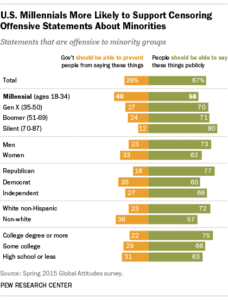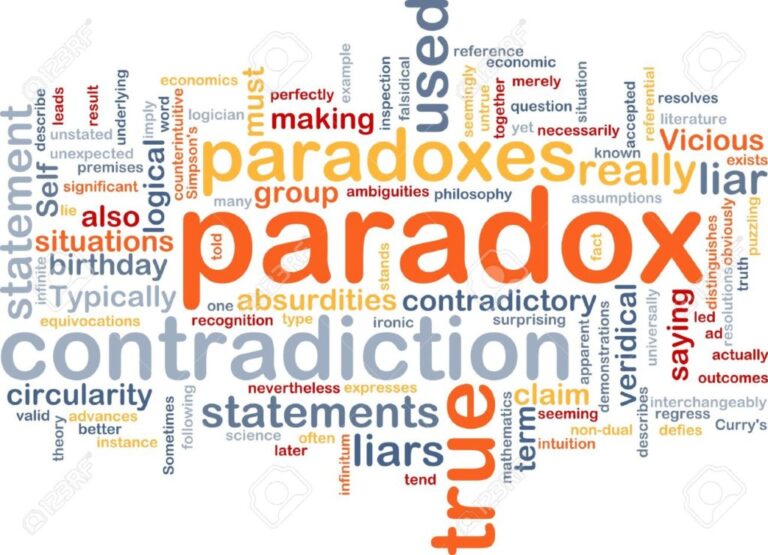It is amazing that 40% of our younger generation (Millennials) are against free-speech. And it is not even allowed on my campus, as my own colleagues have tried to shut down a long-standing debate series I moderate. This article offers some hope and practical steps on how to deal with limited-free speech.
We just passed the 500th anniversary of when Martin Luther nailed his 95 Theses on October 31, 1517, requesting a theological debate. It was the ecclesial powers of his day that tried to suppress him. But it was in suppressing his ideas, that his ideas became more and more popular. And it is happening all over again–but this time the totalitarianism is coming from our secular friends who are fighting against anything being nailed (Tweeted) in public that disagrees with them.
 We Christians have done the same thing in the past by the way! Read on to see.
We Christians have done the same thing in the past by the way! Read on to see.
This country is leading toward a totalitarian society that is ruled by some politically correct dictators who want to live in echo-chambers where only their ideas and ideologies are heard. In the same way, the Right used to do it to the Left, the Left is now doing it to the Right.
Faculty members who do that in a secular academic institution of all things that champions free speech and expression is the height of irony.
When we limit free-speech, we do become speech police.
For the past 8 years, I have moderated 14 debates on everything from racism, terrorism, religious exclusivity and even global warming. If you thought that one was heated, wait till I tell you about the debate we had on homosexuality!
That one got people from across the seven city colleges steaming. They were so upset that we would dare to debate this topic at the college of all things…that they wrote letters upon letters demanding our college president to shut down the debate. And these professors and staff were self-styled liberal progressives of all things.
Yes this is a form of Christanophobia.
What they wanted was an echo-chamber. It’s as if their appendix burst and had labour like contraction all over the college halls when I announced the debate.
Those who cried for tolerance were intolerant of the other side—this is not new.
The college president at the time gave in and forced me to cancel the debate.
And just last month it happened again.
There were petitions around campus demanding I cancel this debate too. But this time our current president was for free speech and would not allow them to get their way.
One reason given was the “offensive nature” of one of the debaters. He was Dr. Fuz Rana of Reasons to Believe. He was debating Dr. Stanely Cohn from DePaul University on design. What was Dr. Fuz’s crime? Daring to question Islam and the consensus on evolution.
You can see that debate here.
And can you believe that in our colleges here in the USA there is a “free speech zone.”
Yes, students need to take off their emotional diapers and realize that they will be offened by others in life. Making free-speech zones is not the way forward.
Rather we should have physically safe zones not speech-safe zones.
In two recent articles titled “A Confession of Liberal Intolerance” and “The Liberal Blind Spot,” in the New York Times columnist Nicholas Kristof accuses professors in the Humanities and Social Sciences of discriminating against “conservative” academics.
Kristof argues there’s a great injustice going on at colleges and universities across the country where “liberal” professors…show “intolerance” towards underrepresented “conservatives.” They used to believe, I disagree with what you said but will defend your right to say it. Now things have changed, they say “I disagree with what you say, thus shut up!”
Now the people on the political thrones today (or think they should be on them) will not allow creationism and evolution to be even debated. The times have changed those in power—but the intolerance remains.
This is happening around the globe and documented manifold times by our media. This is nothing new. Liberal elites are attacking and stifling free speech as much as were religious conservatives of the past. The organization FIRE has documented thousands of these cases across the USA.
This is not education this is indoctrination.
This is happening around the globe and documented multiple times by our media. This is nothing new. It is happening across the USA and Europe. Liberal elites are attacking and stifling free speech as much as were religious conservatives of the past.
But also in the Middle East, which I was born, there is, at no surprise to anyone from that part of the world, a limit to free expression there too with regard to religion and politics, and especially on conversions.
The Islamic Prophet Muhammad said ‘baddala deenahu, faqtuhulu’ “من بدل دينه فاقتلوه “ “Whoever changed his (Islamic) religion, then kill him.” — In the Hadith of Al-Bukhary (number 6922) Volume 9, Book 84, Number 57
Our Muslim friends can tell us this is in the past. But consider, as a result of Muhammad’s words and similar commands, twenty-three Muslim countries in Africa, the Middle East, South Asia, and Southeast Asia have laws that make apostasy, or renouncing Islam specifically, a capital offense. For one example among thousands, in May 2014 the Sudan Government sentenced to death Meriam Yehya Ibrahim Ishag, who was pregnant and who had married a Christian man to hang for apostasy (The woman later gave birth in jail.) In Iran and in Pakistan, and other Muslim countries Muslims who converted are being held or killed for converting. This is not a fringe group or minority who believe this.
Recent analysis by Pew Research shows over 50% of Muslims in the Middle East and North Africa favor Sharia Law, which has execution as the penalty for those who convert from Islam. Thus, all four schools of Islamic Jurisprudence (Maliki, Habbali, Hanafi and Shafi and Shite Jurists) declare death for apostates. Islamic scholars are debating this issue today.
Should there not be a limit to free speech?
Yes, when it directly incites violence. ISIS, the KKK, the Black Panthers or even those whose main goal is death and destruction.
In the following I will offer some ways we can move the conversation forward.
First, Use the laws of your country to your advantage. For example, the first amendment of the US Constitution is about free expression, about speech we disagree with not what was “civil.” The dialectic is all about robust and open discussion of controversial issues. Again, this is not absolute. Incitement of illegal activity, defamation, death threats and physical harassment are not protected by the 1st Amendment: ISIS, the KKK, the Black Panthers or even those whose main goal is direct death and destruction, do not have this protection. The Apostle Paul used his Roman citizenship (Acts 16:37-38, 22:25-28) to appeal his case. Sometimes the law is against us. That is OK too. Because we should obey God rather than man (Acts 5:27-29). We just need to be ready for the consequences.
Address so called “hate speech” laws that seek to stifle Biblical speech on campus or in the public square. Scholar and author of Erwin Chemerinsky in his book said, “Free Speech on Campus,” that “Over 300 colleges and universities adopted hate speech codes in the early 1990s. Every-one to be challenged in court was ruled unconstitutional. And there are good reasons for that.” We must use the law to fight injustice as much as possible.
Second, remind your secular friends who want to silence you, that when one person’s voice is allowed to be silenced, everyone’s voice is placed in danger—including theirs.
Third, speaking the truth in love is a biblical obligation (Eph 4:15). Any governmental law that promises its population the right to speak the truth aligns with Biblical principles. However, any regulation that subdues a citizen’s right to speak what they believe is true, is operating against God’s ways.
Having freedom of speech does not mean that truth is expressed, but it does give it a voice. But sometimes the wisest thing to say is nothing at all.
Jesus did not even respond to some of his accusers. But when you do respond, do it with so much respect that they feel guilty for their charges against you. Speak out, in respect, so that your words are seasoned with salt (Col 4:6)!!
Forth, don’t be afraid to offend. But our goal is not to never to offend. Leave that to the truth. It is by its very nature offensive to the world. Do not be surprised when people oppose or are offended by you or your words. “If the world hates you, know that it has hated me before it hated you (Jh 15:18).”
Brothers and sisters, we are not called to Win Friends and Influence people (great ethics, but bad theology). Do not be surprised that the world will act like, you guessed it, the world! But that is no excuse for some of us to be rude or condescending to others!
Let’s remember that the Lord Jesus all but guaranteed we would find persecution: “He said I have said these things to you, that in me you may have peace. In the world, you will have tribulation. But take heart; I have overcome the world (Jh 16:33).”
Fifth, we must admit that everyone has an agenda. We all do. Beware of people who pretend to be neutral. Our agenda should be one bathed in passionate love, balanced by humble truth.
As Martin Luther said, faith without works is like a fire without smoke. Love without truth is chaos and superficial. Truth without love is dangerous and cold. Remind your friends that to “oppose people with an agenda” is an agenda.
Sixth, we must not forget that our own Christian brethren from the past were against free speech and punished those who spoke against their ethics or theology! The Scopes Trial or the Monkey Trial of 1925 is a lesson for us today. The religious elite at the time would not allow evolution to be taught or debated on campus. The people on the political thrones today will not allow creationism and evolution to be even debated. The times have changed those in power—but the intolerance remains.
In the Ancient Near East, and in the Old Testament there are laws against blasphemy. This was punished by death and the most famous victim of this is Jesus himself. Our Christian brothers and sisters stood their ground in the first century when it was against the law to preach. Many of them died for this and refused to remain silent. However, when Constantine converted in Rome, from 320-330 he began to attack non-Christians through his governmental powers.
As Christianity grew into the biggest religion in the world, feelings changed. Christians persecuted fellow Christians who had views that were different from theirs too. The Catholic St. Thomas More (1485-1535) was executed because he refused to renounce his loyalty to the Papacy and the Catholic Church by Protestants. And the author of the amazing Pilgrim’s Progress, The Protestant John Bunyan was imprisoned in 1660 for preaching without a license and John Huss, whose death inspired Martin Luther later, was burned alive by Catholics.
Remember through all this bloodshed, the nail pierced hands of Jesus were and still is in control.
Seventh, learn from our brothers and sisters who spoke and died for Christ in the public square. The civil rights protests of the 1960s, the protests and demonstrations — were essential to civil rights acts and brought the end of Jim Crow laws that segregated human beings on color alone—were opposed by Christians. It was only in 1920 that women got a right to vote in the USA via 19th Amendment, but that was a result of massive parades and speeches. The Egyptian uprising of 2011 helped collapse the reign of dictator Hosni Mubarak—but what “freedom” has this brought to Egypt?
Let’s not start our own movements without learning from the successes and failures of the past. So do your research.
Eighth, remember that the line between secular and sacred is not Biblical. Standing up in culture for free speech is not unbiblical or secular. Charles Spurgeon wrote that “the sacred has absorbed the secular.” In his sermon, ”All For Jesus”:
He wrote:
To a man who lives unto God nothing is secular, everything is sacred. He puts on his workday garment and it is a vestment to him. He sits down to his meal and it is a sacrament. He goes forth to his labor, and therein exercises the office of the priesthood. His breath is incense and his life a sacrifice. He sleeps on the bosom of God, and lives and moves in the divine presence. To draw a hard and fast line and say, “This is sacred and this is secular,” is, to my mind, diametrically opposed to the teaching of Christ and the spirit of the gospel. Paul has said, “I know, and am persuaded by the Lord Jesus, that there is nothing unclean of itself” [Romans 14:14].
In the final analysis, for us Christians, true freedom of speech is not saying whatever we want, but what we should.
~~~~~~~~~~~~~~~~~~~~~~~~~~~~~
Khaldoun Sweis is Tutor of Philosophy at Oxford University and Associate Professor of Philosophy at Olive-Harvey College in Chicago. He blogs at logicallyfaithful.com




